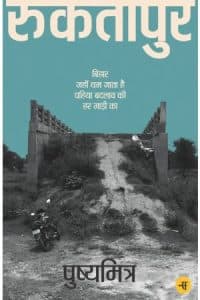‘Ruktapur’ by Pushyamitra, stands out for its ability to give voice to the silenced narratives of Bihar’s marginalized communities. It lays bare the obstacles that hinder their developmental journey, offering a poignant insight into their lives. Through heartfelt encounters and candid conversations, the book unearths the untold stories, unveiling the sorrows and pains of ordinary people, starkly contrasting with the glossy statistics offered by official sources. In the eyes of journalist Pushyamitra, Bihar has always been a profound reflection of India itself, a microcosm of the nation’s essence. For him, it could very well be considered the heart and soul, the very centre of the universe. Within its pages, a distinct narrative unfolds – one marked by tales of hardship, suffering, resilience, love, moments of happiness, and glimmers of optimism among the marginalized. [caption id=“attachment_13164962” align=“alignnone” width=“766”] Book: Ruktapur by Pushyamitra
Book: Ruktapur by Pushyamitra
Published by: Rajkamal Prakashan
Price: INR 250/[/caption] The book comprises ten chapters, encompassing an introduction and an appendix. Within each of these chapters, you will find a varying number of reports, ranging from four to six reports per chapter. Apart from the introduction and appendix, specifically, two chapters contain only one report each. Central to its essence, ‘Ruktapur’ serves as a poignant testament to the endeavours of everyday individuals in Bihar, who harbor aspirations of advancing along the trajectory of progress, all while grappling with daunting challenges. Pushyamitra’s writing not only informs but also prompts introspection, making it a significant contribution to both journalistic writings and social discourse. This book vividly portrays a Bihar that often finds itself relegated to the fringes – a region seemingly overshadowed by notions of progress, modernisation, and transformation. While he vehemently criticised the state’s corrupt and caste-dominated governance, the inherent violence within its society, the stagnant state of its intellectual and cultural realm, and the apathetic attitude of its elite, he was equally compelled to celebrate its illustrious cultural and spiritual heritage, the unwavering resilience of its enduring people, and the revolutionary spirit that dwelled within its youth. In this book, he pours forth his intricate emotions and perceptions, capturing the dichotomy of the state’s flaws and its exceptional virtues. Through his candid portrayal, Pushyamitra portrays Bihar as a mirror to the larger canvas of India, intertwining the complexities of a nation in transition, rife with contradictions, and brimming with immense potential for transformative change. With every word, page and chapter, Pushyamitra captures the essence of Bihar’s identity, both its struggles and its aspirations, revealing the depth of his attachment to this vibrant land. His book stands as a poignant exploration of what Bihar meant to him – an amalgamation of both disappointment and hope, a canvas that paints a larger picture of India’s journey towards progress and change. ‘Ruktapur’ is a book that also delves into the history, politics, society, and culture of Bihar. It appears to offer insights into the current state of Bihar and how its growth or decline has evolved over the last 73 years. By providing historical evidence, the book may shed light on various contemporary issues faced by the state. The author not only documents his firsthand observations but also offers a meticulous factual analysis of the prevailing situation and provides statistics for reference. The book vividly illustrates the aspirations of the common Bihari, yearning for progress and development. Even the political leadership, who came into power with promises of social justice and liberation, seems reluctant to untie these burdens and enable genuine progress for the people. For example, he writes in the book, which I am trying to articulate here: The entire group of young individuals was part of the Bhuiyan community. Curious about their choice to play cards instead of pursuing livelihood opportunities, I inquired about their decision. One of the youths began explaining their situation, highlighting that the ban imposed by Nitish Kumar, their political leader, had severely impacted their lives. Specifically, the prohibition had led to the collapse of the stone crusher industry, which was previously thriving in their region. I attempted to reason with them, asking whether they considered the preservation of natural landscapes important. I asked, “Would you prefer a scenario where the mountains vanish?” Despite my efforts, the group remained resolute in their stance, collectively asserting that Nitish Kumar’s policy had stripped them of their means of income. Their frustration was palpable, and they were determined to voice their dissatisfaction through the upcoming election. Navigating the conversation towards environmental considerations proved to be a challenging endeavour. The complexity of ecological issues and their implications were met with resistance as they firmly associated their economic plight with the actions of the government. During shining claims of double-digit growth figures touted by the government, the book ‘Ruktapur’ fearlessly shines a light on the sharp divide that exists. It illuminates the disheartening tales of deprivation, helplessness, and suffering experienced by those living on the fringes of society. The story told within these pages serves as a poignant reminder that progress is not merely measured by impressive statistics but by the tangible improvements in the lives of every citizen. This book also masterfully portrays the harsh ground reality through a multitude of issues, such as the recurring challenges of flood and drought, the struggles within the government system, land rights disputes, the faltering education system, the pressing problem of unemployment, and the poignant reality of migration. He further writes in the book: In June of 2018, an intriguing Facebook post caught my attention. It proclaimed, “Good Newwz - Saharsa Junction Tops in Revenue Collection.” The post piqued my curiosity, prompting me to investigate how this modest junction in the Kosi region managed to secure the top spot in revenue generation. A quick Google search unveiled the astonishing fact that between the 13th and 17th of June, ticket sales at Saharsa Junction amounted to a staggering two crore rupees. Surprisingly, during this period, even larger stations like Patna, Mughalsarai, Muzaffarpur, and Samastipur reported comparatively lower ticket sales. The individual behind this status update happened to be a young Saharsa resident. His pride in this achievement was palpable, as he not only celebrated the accomplishment but also called upon the Railways to enhance passenger amenities at Saharsa Junction, considering its exceptional revenue performance. However, as I absorbed this information, a sense of unease began to settle in my heart. Further investigation revealed that a significant portion of the travellers departing from this station belonged to the working class. It came to my knowledge that during that period, a seasonal migration was underway to Punjab and Haryana for agricultural work. It struck me that if ticket sales had amassed two crore rupees within a mere five-day window, this implied that approximately 60 thousand laborers might have embarked on their journey from Saharsa Junction during that period alone. Subsequently, news emerged that a similar scenario unfolded at Darbhanga Junction as well, emphasizing the widespread phenomenon of labour migration during that time. This realization weighed heavily on my conscience, underscoring the poignant reality that many of these travellers were part of the working class, seeking livelihood opportunities far from their homes. As the narrative unfolds, it not only lays bare the failures of policymakers but also prompts a deeper introspection into the very essence of development. Instead of uplifting the lives of the underprivileged, the concept of development, as depicted in the book, appears to cloak their hardships with cleverly manipulated statistics. It can be said without exaggeration that very few contemporary writers have spoken and written about the glorious past, the dismal present and the potential for a great future of this state with such sensitive eloquence as Pushyamitra did in his book ‘Ruktapur’. The author of this book has demonstrated the true essence of his profession by maintaining an impartial perspective. The book ‘Rukutapur urges us to seek meaningful and sustainable solutions that address the root causes of these challenges, empowering the underprivileged and creating a more equitable and just future for all. There are melancholic personal anecdotes that add immensely to the literary richness of the book. The inclusion of melancholic personal anecdotes adds a profound layer of literary richness to the book, making it an extraordinary masterpiece by the talented journalist and author, Pushyamitra. The manifestations of governmental negligence and disregard are conspicuous across various domains, particularly evident in the context of the encephalitis issue. It’s clear that timely intervention can safeguard children from this ailment. Vital to this effort is the development and reinforcement of primary health centres. However, Nitish Kumar’s approach appears focused on making electoral promises to augment the capacity of larger hospitals. Despite having effectively managed this disease for several years, it inflicted numerous casualties upon children in the past year. In fact, Bihar’s healthcare system has often resembled a frail thread that snaps at the slightest tension. The government’s approach to the escalating fluoride levels in water is nothing short of reprehensible and negligent, as it’s resulting in fatalities. The tapestry of economic turmoil is intricately woven with deep-rooted social and feudal intricacies. Despite political rhetoric centred around development and social justice, Pushyamitra asserts that these endeavours often merely scratch the surface, failing to penetrate the core of the deeply rooted poverty that persists unabated. However, were political sociologists to meticulously analyse these facts, they might discern the underlying ideological ironies. These very ironies seem to thread through the political priorities of Bihar, acting as the invisible strings that intricately connect and influence them. Pushyamitra also writes in the book that Bihar has undoubtedly witnessed certain developments, evidenced by the construction of roads and improvements in the electricity infrastructure. However, he contends that these advancements fall short of addressing the profound challenges plaguing the state, notably the entrenched issues of poverty and neglect. While reading this book despite that Bihar stands as a focal point, the essence of this book touches the soul of every state, urging us to collectively address the core issues that underpin the promise of our nation’s democratic journey. It calls upon policymakers, citizens, and leaders alike to confront the realities of our time and forge a path of progress that leaves no one behind. In the book ‘Ruktapur’ Pushyamitra, intricately weaves anecdotes with a solid foundation of data, resulting in a captivating literary work that effortlessly captures the reader’s attention. With a fusion of storytelling and factual substantiation, the book maintains a harmonious balance that not only informs but also engrosses its audience. The writer is a Bengaluru-based management professional and literary critic. He can be reached at ashutoshbthakur@gmail.com. Views expressed in the above piece are personal and solely that of the author. They do not necessarily reflect Firstpost’s views. Read all the
Latest News
,
Trending News
,
Cricket News
,
Bollywood News
, India News
and
Entertainment News
here. Follow us on
Facebook
,
Twitter
and
Instagram
.
Book review | ‘Ruktapur’ serves as a poignant testament to the harsh ground realities of Bihar
Ashutosh Kumar Thakur
• September 25, 2023, 11:36:25 IST
Pushyamitra’s writing not only informs but also prompts introspection, making it a significant contribution to both journalistic writings and social discourse
Advertisement
)
End of Article